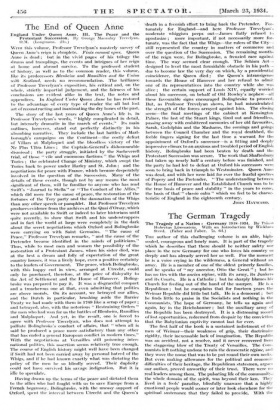The German Tragedy
The Tragedy of a Nation : Germany 1918-1934. By Prince Hubertus Lowenstein. With an Introduction by Wickham Steed. (Faber and Faber. 7s. 6d.) Tim author of this challenging volume is an able, high-, souled, courageous and lonely man. It is part of the tragedy which he describes that there should be neither safety nor place in the new Germany for one who loves his country so deeply and has already served her so well. For the moment he is a voice crying in the wilderness, a General without an army. He is a member of one of the oldest princely families, and he speaks of " my ancestor, Otto the Great " ; but he. has no ties with the ancien regime, with its army, its Junkers and its Courts. He is a Catholic ; but he sharply blames his Church for feeding out of the hand of the usurper. He is a Republican ; but he complains that for fourteen years the Weimar Republic did little but talk. He is a democrat ; but he finds little to praise in the Socialists and nothing in the' Communists. The hope of Germany,. he tells us again and again, lay in the Reichsbanner ; but the auxiliary army of the Republic has been destroyed. It is a distressing record, of lost opportunities, redeemed from despair by the conviction that the Babylonian captivity cannot last for ever.
The first half of the book is a sustained indictment of the men of Weimar—their weakness of grip, their doctrinaire: rigidity, their inexcusable lack of imagination. The Republic. was an accident, not a resolve, and it never recovered from: the staggering blow of the Treaty of Versailles. The Coni7. munists left nothing undone to ruin the democratic regime, and. they wove the noose that was to be put round their own neeks.• But even making allowance for the political and economic difficulties of their heritage, the Republican statesmen, argues our author, proved unworthy of their trust. There were nu, real leaders among them. The pulsating life of the community,: the whole domain of the spirit, was beyond their ken. They lived in a fools' paradise, blissfully unaware that a highly emotional people would sooner or later look elsewhere for the spiritual sustenance that they failed to provide. With the
foundation of the Reichsbanner in 1924, an instrument of priceless value was placed in their hands ; but neither the Government nor the Socialist chiefs had the wit to use it for Republican defence. Worst of all, they never really under- stood the problem of Youth. And here the author speaks of what he knows ; for he is only in his twenty-eighth year, and during his brief political career he was the rising hope of the Reichsbanner lads. Deaf to the warning of coming danger and irresolute in the hour of trial, the Weiinar Republic collapsed without a struggle on July 20th, 1932, when Braun and Severing tamely surrendered to the arch-reactionary Papen, the nominee of the faithless President. So disgusted is the author with the men of Weimar that he desires to exclude them front all share in the governance of the country when it regains its freedom.
If the indictment of the Republican leaders is severe, in his attack on the Nazis his voice often rises to a shriek. Like other good democrats, Prince Liiwenstein feels degraded by the spectacle of a great and civilized nation in bondage to a group of men who are essentially uncivilized, and whose crimes against humanity are beyond forgiveness. The whole of Germany has become a prison, he cries in the bitterness of his soul ; the Third Reich is an evil spell cast on the German people ; Hitler is a sorcerer ; the Swastika is a mark of infamy. " Never, as long as the world has lasted, has God's image been defiled as it is now in Germany." How long the system will last he makes no attempt to forecast. Much will depend on the development of the economic situation, in which he finds at present nothing but " sheer Coueism." Still _ more will turn on the fate of Austria ; for only if the little Republic is kept out of the clutches of Hitler is there an assured hope for the future of the Reich. " Austria holds the destiny of seventy million Germans in her hands." In one passage the author confesses that National Socialism may quite conceivably succeed in establishing itself permanently ; but his more usual tone is that of confidence that the fever will pass. His reading of the Leader as a tool and a nonentity encourages him to believe that a Dictatorship without a superman is doomed. When the great collapse occurs, the helm must be seized by young men, patriotic, unselfish, imaginative, who have learned from the tragic mistakes of their predecessors.
It is clear that the author casts himself for a leading role when the wheel of fortune comes full circle. And why should he not ? He is young and full of exuberant self- confidence. His countrymen crave for leadership. The psychological landscape may change with startling rapidity once again. Meariw4ile Prince Liiwenstein consoles himself with the thought of the punishment that awaits the male- factors who have made him an eXile. " More dreadful even than death will be the penalty that compels the guilty men to wear always in public their hated uniforms and their dis- graced and despised symbols." Such emotional passages bear witness to the youth of the writer ; but it is not very rash to prophesy that more may be heard of him in the years































































 Previous page
Previous page